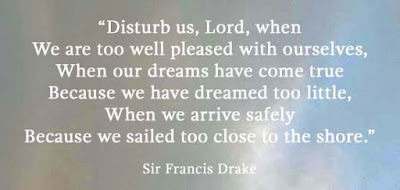You
want to change your readers, not just entertain them.
Be
sure at least some of your memoir’s stories challenge your readers to think.
Make
them question.
Motivate
them to stretch and wrestle with issues.
Move
them to examine their assumptions and expectations to see if they’re valid.
Challenge
your readers to do what Mike Metzger calls “a doggie head-tilt.” To look at
things differently than before. Mike says, “If your head never tilts, your mind
never changes.”
Persuade
readers to tilt their heads and look at issues from another angle. To rethink
what they believe. To reevaluate—and to maybe arrive at a different conclusion
than they ever have before.
Open
their minds to other possibilities, other interpretations, or other meanings.
Write
stories that will give readers
a
holy discontent with things that are not right in their lives—
not
to make them wallow in guilt,
but
to offer them God-pleasing options.
James
4:8-10 comes to mind:
“Come
close to God, and God will come close to you. . . .
Purify
your hearts,
for
your loyalty is divided between God and the world. . . .
Humble
yourselves before the Lord,
and
He will lift you up in honor.”
Also, see John 14:27.
Write
stories that will give readers
a
holy discontent with the ways of the world—
materialism:
possessions and trinkets,
meaningless
mindsets and pursuits—and instead
inspire them to live lives of God-centered
substance and purpose.
Elaborate
on what Jesus meant when he said,
“You
do not belong to the world,
but
I have chosen you out of the world” (John 15:19).
Also, see Romans 12:2.
The
following prayer teems with ideas for your memoir:
Disturb
us, Lord, when
We
are too well pleased with ourselves,
When
our dreams have come true
Because
we have dreamed too little,
When
we arrive safely
Because
we sailed too close to the shore.
Disturb
us, Lord, when
With
the abundance of things we possess
We
have lost our thirst
For
the waters of life;
Having
fallen in love with life,
We
have ceased to dream of eternity
And
in our effort to build a new earth,
We
have allowed our vision
Of
the new Heaven to dim.
Disturb
us, Lord, to dare more boldly,
To
venture on wilder seas
Where
storms will show Your mastery;
Where
losing sight of land,
We
shall find the stars.
We
ask You to push back
The
horizons of our hopes;
And
to push into the future
In
strength, courage, hope, and love.
Attributed
to Sir Francis Drake, 1577
Look
at the first couple of lines: “Disturb us, Lord, when we are too well pleased
with ourselves.”
- What does “too well pleased with ourselves” mean to you, specifically?
- What past events come to mind?
- When were you too pleased with yourself? Or was someone else too pleased with himself?
- What were the results of that mindset?
- Why would/should we pray for God to disturb us over that attitude? What Bible verses illustrate that?
- What lessons can you share with your readers?
Look
at the next couple of lines: “Disturb us, Lord, when . . . our dreams have come
true because we have dreamed too little.”
- What does dreaming “too little” mean?
- When did you, or someone you know, dream too little?
- What was the result?
- Why should we want God to disturb our wimpy dreams?
- Tell readers the lessons you learned and how things could have been done differently. In this way, you are mentoring your readers.
Sift
through your memories for stories that illustrate “Disturb us, Lord, when . . .
we arrive safely because we sailed too close to the shore,” and when we focus
on an “abundance of things.”
Then
look at the third stanza.
- When did a different you dare more boldly and venture into wilder seas where, as a result, storms showed you God’s mastery?
- What can you write about “discovering the stars”?
- You’ll want to explain what the following means: “wider seas,” “storms,” “God’s mastery,” “losing sight of the land,” and finding “stars.”
Remember,
writing
your memoir is not just a hobby.
God
can use your story to guide, inspire, encourage, influence, motivate, and
empower.
“Sometimes a particular story, or version of a story,
is so potent,” says Ayd Instone,
“that it becomes so interwoven in our lives
that it defines the direction our life story takes
and modifies behavior. . . .”
In
a similar way, your memoir can change your readers.
Challenge
them to “do a doggie head-tilt.”
Be
intentional. Make it happen.

No comments:
Post a Comment